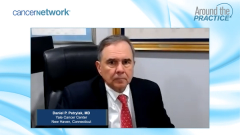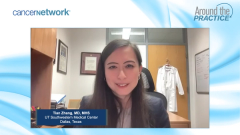
Newly Diagnosed mHSPC: Factors Used to Inform Treatment Selection
Panelists reflect on molecular markers and other clinical factors that aid in the selection of best therapy for a patient with metastatic hormone-sensitive prostate cancer.
Episodes in this series

Transcript:
Alan H. Bryce, MD: Progressing in the case here, for this gentleman we have the biopsy, we get further imaging, further bone metastases throughout the axial skeleton, also ribs, spine, femurs. In the genetic testing, there are no pathogenic variants in the germline. In the somatic testing, and this is a real profile from one of my patients with a CDK12 pathogenic variant, also an NRAS common pathogenic variant. Tumor mutational burden at 3.7 m/MB. This is an MSI [microsatellite instability] stable tumor. Dr Zhang, the patient is now asking about the genetic testing results; how would you discuss these results with him? What would you tell him about these?
Tian Zhang, MD, MHS: When I approach genetic testing in the clinic, I often say that about 10% to 15% of folks ultimately have something that’s directly actionable with what we know today. By those, I refer to what Dr Lowentritt was talking about earlier in terms of the homologous recombination repair defects. In this particular case, I think it’s interesting that he has a CDK12 alteration/mutation. We know that CDK12 has a role to play in some of the recombination events, and it’s thought to be somewhat associated with sensitivity to PARP inhibitors, to genomic stability, and the potential for patients’ susceptibility to immune checkpoint inhibitors. Now, that said, I don’t think it affects his immediate treatment decision-making. But as Dr Lowentritt and Dr Petrylak have said, these alterations can help us make decisions later.
Alan H. Bryce, MD: Yes, absolutely. When we’re talking to this patient about treatment options, how would you pick between ADT [androgen deprivation therapy] versus doublets versus triplets? We’re now in an era where you have a wealth of different potential options for first-line treatment and plenty of equipoise around how to select among the options for various patients. So, how would you approach this particular patient in discussing the treatment options?
Benjamin H. Lowentritt, MD, FACS: Important in all of this is remembering who the patient is, where they are, and what we can expect. This is a young patient. I‘m not going to make any real assumptions, but presumably this is a fairly higher functioning patient and otherwise reasonably healthy. This is a patient who with widespread, high-volume, high-risk disease by any measure, I would recommend triplet therapy. He seems to be an ideal patient for the combination of ADT, docetaxel, and a novel hormonal therapy. I know patients need to have a discussion around that, but I think it is pretty clear in this patient that he seems to be a perfect candidate for that. As a urologist, sometimes that question mark is the chemotherapy fitness of a patient. I’m not used to assessing somebody as to whether they’re chemotherapy fit. This patient certainly warrants a full discussion over the value of chemotherapy in this setting along with one of the other agents.
Alan H. Bryce, MD: Yes. Dr Zhang, how about you? How would you talk through a doublet versus triplet? Patients are going to ask about the toxicity, right? What do you tell them about the toxicity of the options here?
Tian Zhang, MD, MHS: In general, I tell them that we have a lot of standard of care approaches. I agree that with this particular patient who’s in his 50s, 50 is the new 30 right? These patients are often fit and functional and we want to keep them there. A lot of times we talk about controlling the disease as quickly as we can and by doing that, improving a lot of the symptoms of disease and their quality of life. I think we’ll get into that a bit more. From a toxicity standpoint, we talk a lot about with the taxanes, the neuropathy, suppression of the bone marrow, which in a young patient, hopefully his bone marrow is fine. So, his cytopenia issues hopefully will be manageable. Then fatigue and some hair loss, some men do ask about that. Those are the main things. Nausea, vomiting, diarrhea are less so, but certainly part of the toxicity profile.
Alan H. Bryce, MD: Yes, absolutely.
Transcript edited for clarity.
Newsletter
Stay up to date on recent advances in the multidisciplinary approach to cancer.












































